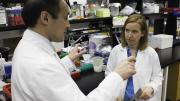Researchers at the Harvard Stem Cell institute have discovered a substance in the blood of young mice that reverses a major effect of aging in the hearts of old mice. The substance, called GDF-11, is an obscure member of the transforming growth factor family of proteins; it was identified by Forst family professor of stem cell and regenerative biology Amy Wagers and Harvard Medical School professor Richard T. Lee, working with a startup company, SomaLogic, that has developed a technology for analyzing factors in the blood. Lee and Wagers report their finding that GDF-11 reverses cardiac hypertrophy, or thickening of the heart muscle, in mice, in the May 9 issue of the journal Cell.
The heart’s walls thicken with age—the primary cause of cardiac failure in humans, explains Lee, a practicing cardiologist at Brigham and Women’s Hospital. Yet in the study, when older mice were given the factor, he says, “we could reverse the heart aging in a very short period of time.” The change from a thickened, fibrotic heart to the smooth-muscled heart of youth is so dramatic, it is reportedly visible to the naked eye.
Wagers had previously discovered, during research in which the circulatory system of a young mouse was surgically joined to that of an old one, that a factor circulating in the blood could reverse aging in skeletal muscle and the spinal cord (see “A Hidden Youthfulness”). But because the heart, unlike many other organs, does not have a known ability to regenerate naturally, she did not expect to see a similar effect there. “The effect of blood-based factors is broader than we anticipated,” she says now.
Nor had Wagers, in her earlier experiments, been able to identify which factor, among the many thousands that circulate in blood, was responsible for the regeneration that she observed. Now she and Lee will take a closer look at the effects of GDF-11. It is known to be important in in-utero development, Lee says, but “its role in adults has not been explored.”
Wagers said in a press-conference call that other organs in the body contain cells with surface receptors designed to interact with the protein, which circulates freely in the bloodstream. The presence of the receptors suggests that GDF-11 may have an effect on those tissues as well, so she and Lee plan to investigate whether the protein has a similar rejuvenating effect on the organs themselves. The researchers hope they may have discovered a substance that is broadly involved in the physiological pathways of aging. Says Wagers, “We should have that answer soon.”









